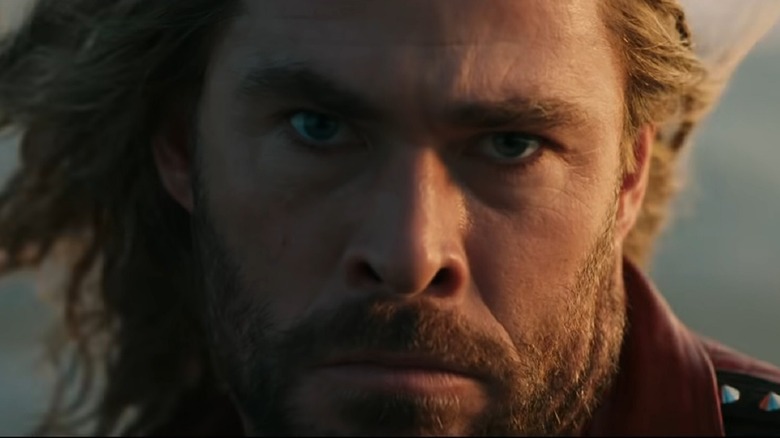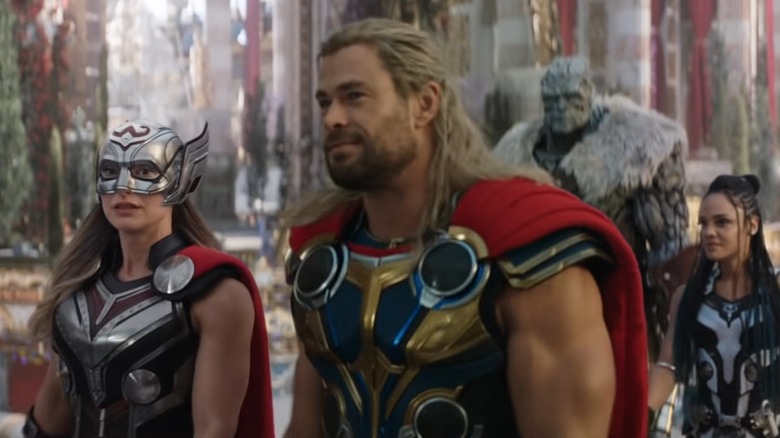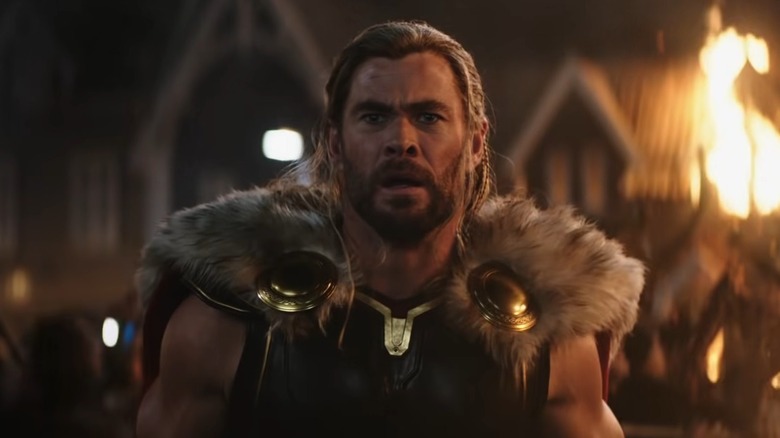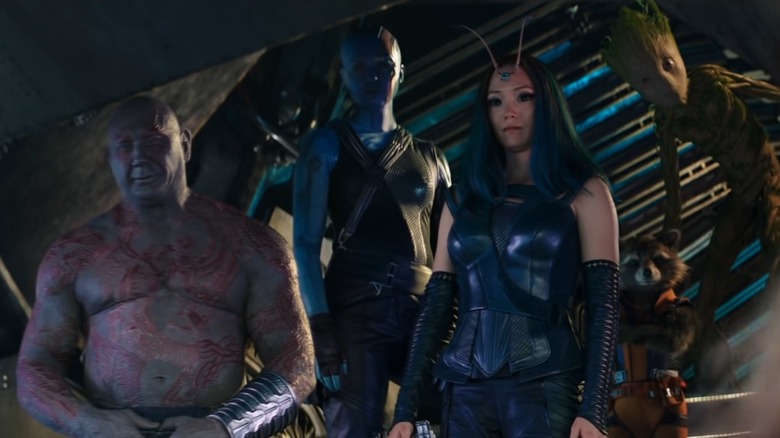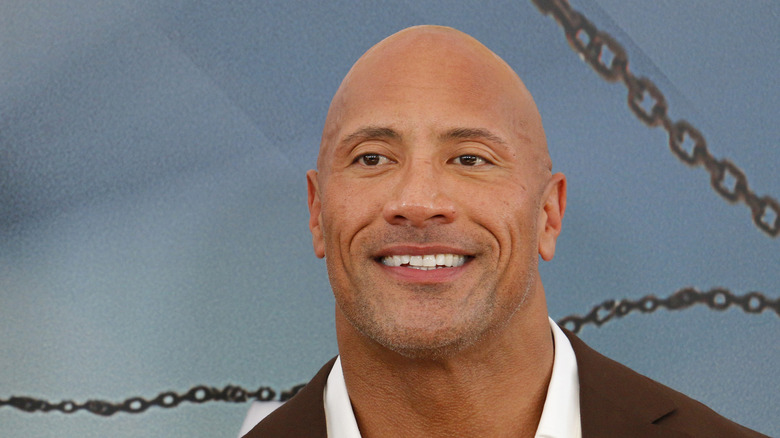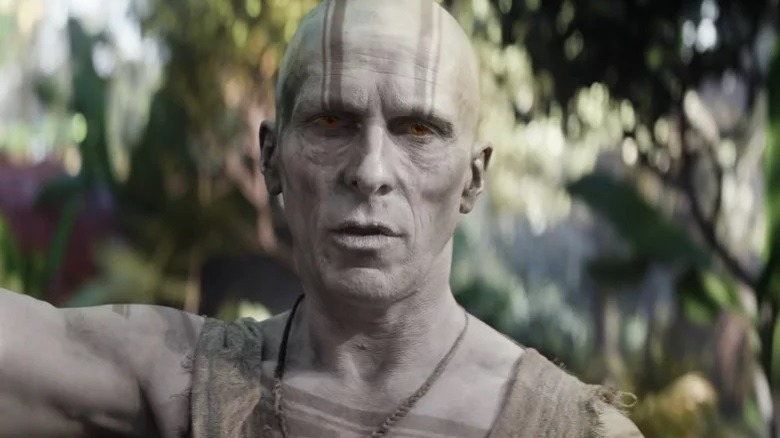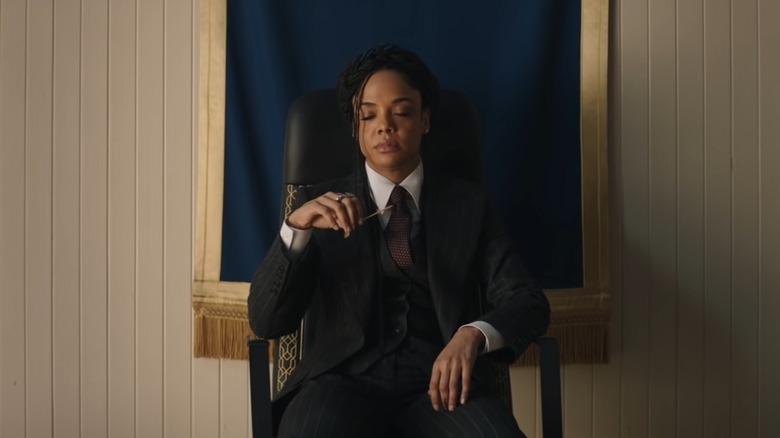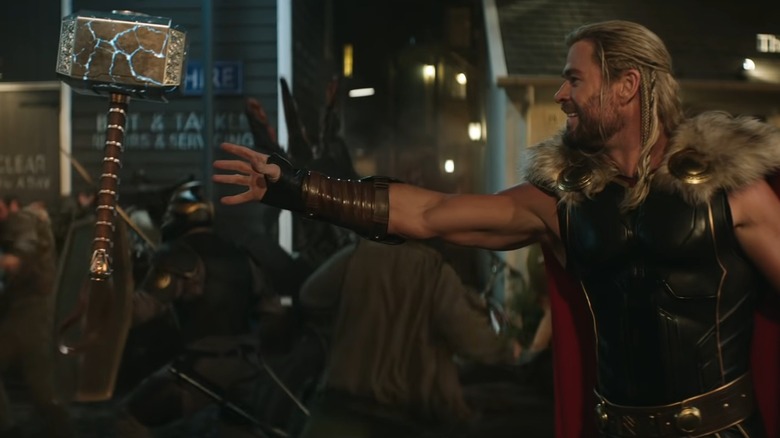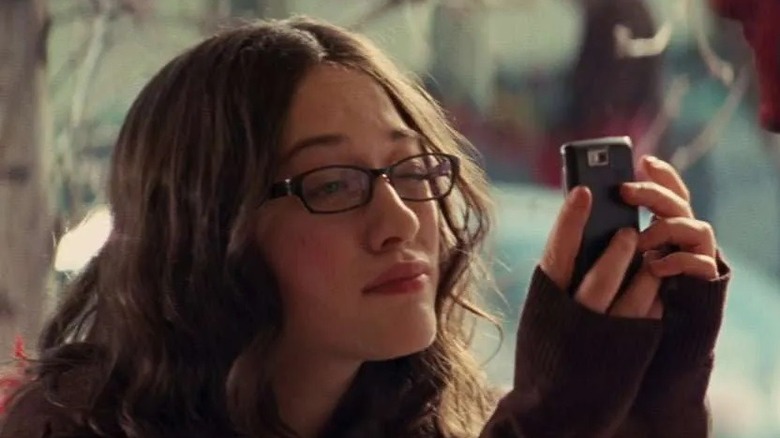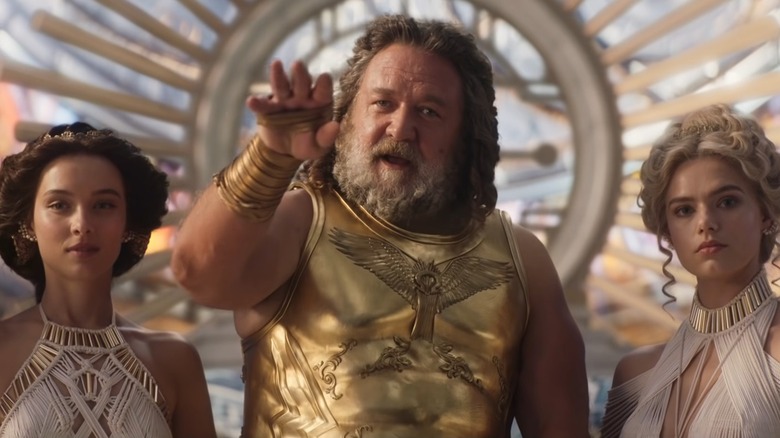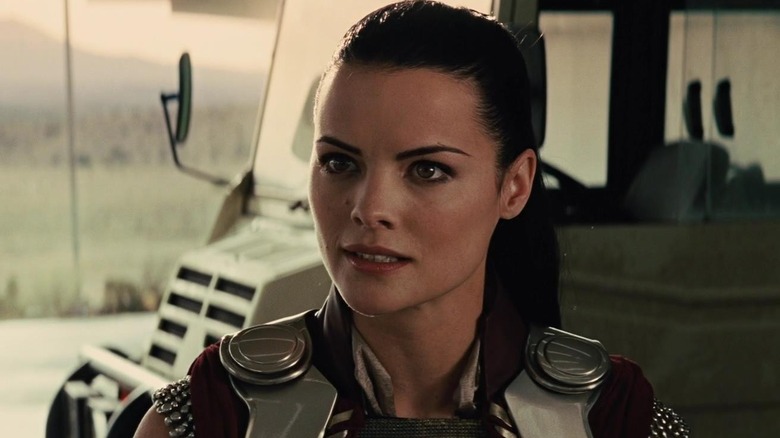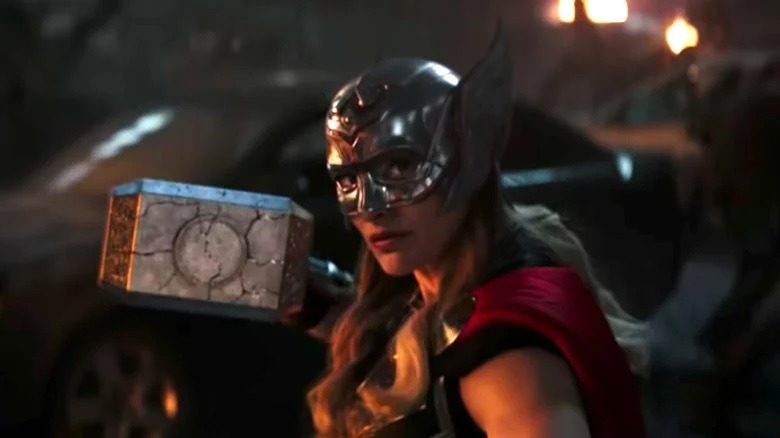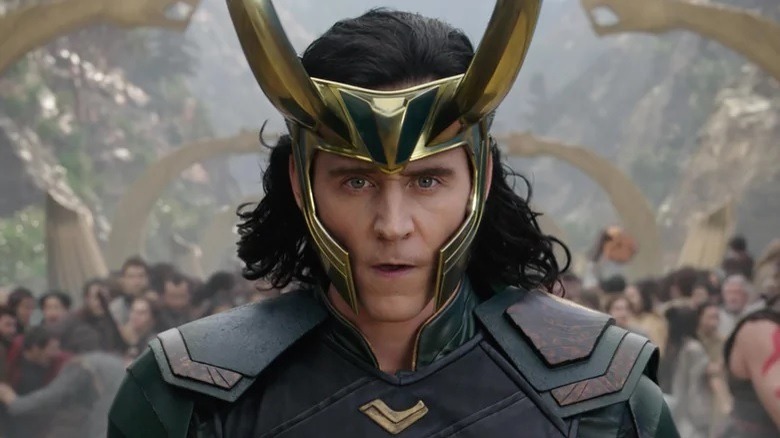Things Only Adults Notice In Thor: Love And Thunder
Subtly isn't in New Zealand filmmaker Taika Waititi's nature, especially considering how "Thor: Love and Thunder" delivers exactly what's implied in its obvious title. Following the comedic blueprint of 2017's "Thor: Ragnarok," the fourth entry in the God of Thunder's MCU adventures proves there's still some spark left in the ol' Avenger and his colorful mythology. More importantly, the comic book movie brings back his old flame, Jane Foster, and gives her a narrative arc that's worthy of her mighty personality.
While the film doesn't redefine the genre with a radical new approach or navigate uncharted waters for the MCU, it does itch with inquisitive moments that get us pondering about what happens on screen and its significance. On the surface, some of these events and concepts seem self-explanatory to the unseeing eye, but they do deserve further consideration and exploration from the audience. For example, why did the MCU only decide to showcase the true extent of Thor and Jane's relationship now? Or why did no one bother to ask Gorr the God Butcher about the real reason for his god-slaying tendencies? Let's tickle our curiosity and find out about the things only adults notice in "Thor: Love and Thunder." Spoilers for "Thor: Love and Thunder" follow.
Thor and Jane had a relationship we knew nothing about
There are couples in the comic book world that inspire and enchant the imagination. They're the sort of relationships that make us point at the screen and say, "I want to feel that." Thor and Jane Foster had the potential to be the star-crossed pair that binds hearts in the earlier films, but Jane was sidelined in favor of Thor and Loki mucking about across the timeline and getting up to all sorts of tomfoolery. Simply put, we were told they loved each other, but we didn't really see — or believe in — it. Even their breakup was treated as a throwaway line in passing rather than as an event that tore Thor's heart open and took away some spark from his thunderous fingertips.
In "Thor: Love and Thunder," the history between Thor and Jane is finally explored through the use of flashbacks. While the comedic element of the film makes us question the authenticity of the moments, there is a whole backstory of the power couple Thane that we never knew about. From rollerblading together to getting drunk and enjoying themselves at dress-up parties, they lived an '80s teen comedy in real time. Judging by all the fun they had, it's a shame this side of their relationship wasn't shown sooner in the MCU.
The gods must be crazy
"Thor: Love and Thunder" positions Gorr the God Butcher as the bad guy, but is he? After being a loyal acolyte of the god Rapu and watching as everything else around him is destroyed, including his daughter Love, he realizes the gods don't see him — or us — as anything more than cockroaches. It's what makes him embrace the Necrosword, turn to the dark side, and become a god slayer feared across the lands.
Now, Rapu isn't simply an outlier or an exception to the rule here. When Thor, Valkyrie, Mighty Thor, and Korg travel to Omnipotence City to ask Zeus and the other gods for help in fighting Gorr and finding the kidnapped Asgardian children, they receive the equivalent of the Bugs Bunny "no" meme. No matter how much Thor protests and warns Zeus about the impending danger, he doesn't care, instead trying to lock up Thor and his friends before Gorr discovers their secret location. The gods appear to be cowardly and more obsessed with living the good life like a bunch of crooked and self-indulgent politicians rather than helping others. Honestly, they're pretty terrible, and it's surprising that Gorr wasn't able to amass a larger army to believe in his cause.
No one in the Guardians of the Galaxy likes Thor
First of all, let's address something important here: the "Thor: Love and Thunder" trailers pulled a fast one on us. They led us to believe that the Guardians of the Galaxy would play an important part in this adventure and be worthy allies, when the two screaming goats receive more screen time than Peter Quill and his motley crew of misfits. It's nothing more than a glorified cameo for Marvel's cosmic comedy group, really.
That said, it's as clear as Groot's three-word vocabulary that the Guardians didn't want a part of this — or Thor — to begin with. While he might have been their secret weapon and destroyer in their clashes across the galaxy, Quill and his crew couldn't pack up their ship and leave Thor sooner than what they did. Look, it isn't like they outright hate the God of Thunder, but he wasn't vibing with them and they needed a bit of a break from him. It's kind of like that friend who only visits once a year — and that one time is more than enough interaction for everyone.
Korg is essentially in love with The Rock in Thor: Love and Thunder
Introduced in "Thor: Ragnarok," Korg has become a fan-favorite character in the MCU. His stony exterior belies a quirky personality and a heart of gold, as he has established himself as one of Thor's greatest allies and closest friends. In "Thor: Love and Thunder," Korg reveals a little more info about his race, the Kronans. He explains how babies are born, detailing that his fathers linked arms over burning lava and he popped out into existence many moons ago.
Considering "Thor: Love and Thunder" is all about electricity and the sweet November rain, Korg, too, finds his special someone in the form of a fellow Kronan named Dwayne. Now, it doesn't take a geologist to figure out what Taika Waititi is doing here. Seriously, a rock named Dwayne? It isn't quite as subtle as doing a U-turn down Jabroni Drive and asking for directions; instead, it lays the smackdown of on-the-nose humor on MCU fans. While Dwayne Johnson might be fighting gods and practicing magic as Black Adam in the DC Extended Universe, he also holds a cheeky, unsolicited part in the MCU. Waititi made sure that the former People's Champ knew his role (and shut his mouth) here.
Gorr the God Butcher just needed a shoulder to cry on
Think about every other LinkedIn message on the website's timeline. It's always something or the other about displaying kindness to the people we encounter since we have no idea about their struggles or what they may be going through. While it might sound cornier than a corn dog factory, it is a sentiment that holds merit and deserves to taken into consideration. Look at poor Gorr as an example of this. He loses everything, including the person he holds most dear in the universe — his daughter, Love. When he turns to his god for help, he is rejected and ridiculed.
Gorr is a broken and angry man who is going through a serious rough patch in his life. Yet, no one stops to ask him: "How are you doing?" Instead, everyone approaches him with an equal intensity and combative attitude, never asking why he behaves in this manner. What's even more humorous is how Thor could have helped him bring back his daughter early on in the film if they had communicated with each other. Gorr didn't need a war; he needed a hug. That said, this would have shortened the runtime of "Thor: Love and Thunder" to about 20 minutes.
Why didn't the Asgardians go along with Thor?
When Gorr the God Butcher takes the Asgardian children into the Shadow Realm, everyone is left stunned. Their poor babies have been kidnapped by a madman, and who knows what he will do to them. Thor, Valkyrie, Mighty Thor, and Korg band together and promise to find and bring the children home to their families. Yet, something doesn't quite make sense here. The parents are more than happy to chill in New Asgard and let a small group search for their kids. Wouldn't it be better if more people joined the search party from the get-go or even later on?
There's strength in numbers, but it appears as if everyone has forgotten it in "Thor: Love and Thunder." Now, the argument can be made that the Asgardians may not be as powerful as Thor and his friends, but the God of Thunder ends up sharing Zeus' power with the children as they battle Gorr and his forces in the final act. Surely, he could have done that with their parents as well, especially with the Asgardians who might have already had some fight training in the past. It's as if Thor and the others deliberately created higher stakes for a more riveting plot here.
The love triangle between Mjolnir, Stormbreaker, and Thor is plain weird
For over a decade, Thor has wielded the power of Mjolnir or Stormbreaker in the MCU. The two magical weapons have served him well on his adventures, even encouraging an ongoing debate among fans about which of them is the most worthy and influential in the battlefield. In "Thor: Love and Thunder," the once-shattered Mjolnir is reborn and wielded by Mighty Thor. While everyone knows how much Thor loved his hammer, the event of seeing his ex-girlfriend holding his ex-weapon sets off the strangest love triangle in the history of comic book movies.
All of a sudden, Mjolnir and Stormbreaker appear to be sentient, showing feelings of jealousy towards the other and trying to gain Thor's undivided attention. It's obvious that Thor wants Mjolnir back, and this doesn't sit well with Stormbreaker. Additionally, the way in which Thor speaks to the weapons feels like he holds deep romantic feelings towards them and doesn't want to disappoint either of them. The whole affair is entirely bizarre. It's the equivalent of feeling bad about using a spoon instead of a fork when eating pasta — it's simply a non-issue.
Darcy Lewis doesn't know what happened to Jane Foster
Some of the familiar faces from previous "Thor" movies show up in "Thor: Love and Thunder." One of them is Darcy Lewis, who appears in a single scene to show her support for Jane Foster while she undergoes chemotherapy. Through the dialogue, it is revealed that Darcy is one of the only people who knows about Jane's terminal cancer. She has been by her friend's side and encourages Jane to see if Asgardian magic could assist her in finding a cure for her condition.
However, that's the last we see of Darcy in the film, as Jane becomes Mighty Thor and heads off on one last adventure. When Jane passes away after using Mjolnir for the final time, she dies in Eternity's realm. The post-credits scene then reveals that she enters Valhalla as a hero. But what about Darcy here? She has no clue where her friend is, or what happens to her. Does she even know that Jane became Mighty Thor? Someone needs to break the bad news to Darcy, because it's the least she deserves for being at Jane's side for so long.
Zeus might be powerless now
A showdown between Zeus and Thor is everything that fans want, as it pits the Norse god of thunder versus the Greek god of thunder and sky. However, in "Thor: Love and Thunder," there's no dispute over who really is the worthy one between the pair. Thor is willing to stick his neck out to save the world, while Zeus wants another drink and to party like it's 1999 B.C. In the ensuing battle between the two gods, Thor impales Zeus with a thunderbolt before Valkyrie removes it from his body and takes it.
As revealed in the mid-credits scene, Zeus survives Thor's brutal beatdown and sends his son Hercules after the Avenger. However, this raises the important question: does Zeus send Hercules after Thor because he's powerless after losing his thunderbolt? In the film, it's shown how the bolt can bestow godly powers on others, but what does this mean for Zeus in specific? He could have other spare thunderbolts lying around in the closet and his power could extend further than hurling it like a javelin, yet it is never made clear what the implications are.
Sif now has a chance with Thor
It's still early days and Thor will undoubtedly have a broken heart to mend after Jane Foster's passing, but there might be another love interest around the corner for him: an Asgardian warrior who is known to all MCU fans. Lady Sif has been Thor's childhood friend and longtime partner in battle, but there is an opportunity for their partnership to blossom into a new romance. She has been on the periphery of the action for the last few films, but with her situated on New Asgard now, it does open up the possibility of the two becoming closer in the future and lighting up the flames of passion if they so choose.
In the comics, Sif has a storied, rich history with Thor, which has seen the two become lovers within the pages of Marvel Comics. With Jane in the picture, it's easy to understand why the MCU strayed from pursuing a relationship between them. However, as the Thor mythology develops and expands into new territories, it's possible that the two warriors could still become an item down the line.
Jane Foster goes through the stages of grief in real time
Unfortunately, Jane Foster doesn't get her happily ever after in "Thor: Love and Thunder." While she is welcomed into Valhalla and leaves her undeniable mark on the MCU as a whole, it's highly likely that she bids her final farewell to the MCU here and there won't be a resurrection like there was in the comics.
Watching her throughout the film also tugs at the heartstrings and leaves something in our eyes, as she copes with the five stages of grief and comes to terms with her looming fate. When we encounter Jane in the story, she experiences initial denial about her prognosis. She still wants to work and doesn't believe the seriousness of the illness. This quickly shifts to anger, as she wonders why this is happening to her and she can't stop it. In the bargaining phase, she becomes Mighty Thor and believes there is a chance she can overcome the cancer through space Viking magic. After Mjolnir's effects weaken her, she falls into a depression, realizing her last hope has been dashed. Eventually, she comes to accept the inevitable. She is at peace with what is to come and lifts the hammer one last time to help Thor. It's bittersweet how Jane dies a hero but on her own terms.
Love is Thor's new Loki
The ending of "Thor: Love and Thunder" changes the status quo of Thor. While he searched for a purpose for so long, he now has a new one: to raise and look after Love, Gorr's resurrected daughter. He appears to take his fatherly duties extremely seriously, as he tries to teach Love the right lessons and encourage her to be the best person she can. Taking a look at her behavior and how she responds to him, though, she looks to be quite the handful.
Her reactions and general disdain towards authority is reminiscent of a certain Loki. He, too, didn't enjoy following the rules and gave Thor and Odin many headaches over the ages. With all the signs pointing to Thor and Loki's arc being over in the MCU, it's possible that Love has now taken over this pivotal role in Thor's life. After all, someone needs to keep him on his toes.
